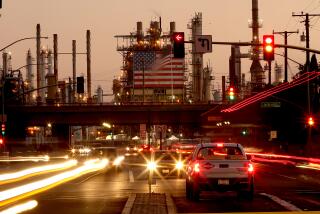Firm Hopes Clean Air Law Will Lift Sales : Technology: Struggling Pollution Research and Control Corp. expects the new federal clean air act to increase demand for its emissions monitoring devices.
Pollution Research and Control Corp. is a tiny Glendale company that makes devices for monitoring air pollution. Since it was founded in 1971, its success in the U.S. market had been limited, so in 1988 Pollution Research turned to overseas markets--particularly South Korea--which recently have accounted for more than half of its sales.
Unfortunately, the Korean market has proved an unsteady one for Pollution Research, and in the year that ended June 30, the company lost $1.45 million on $5.4 million in revenues. Not only were South Korean sales slipping, the same was true for domestic sales.
But with the new federal clean air act, signed Thursday by President Bush, Pollution Research stands to participate in what could be a bonanza for companies that make pollution control and measurement products. These products will be needed by government agencies and factories to measure emissions of sulfur dioxide and other pollutants from smokestacks and in the surrounding air.
âWe see a very positive impact,â said Albert E. Gosselin Jr., Pollution Researchâs president and chief executive. Gosselin estimated that the legislation could result over the next year in a more than $2-million jump in the companyâs sales.
Gosselin said specific provisions in the legislation that will most directly help his company are those concerning acid rain. Pollution Researchâs monitors measure sulfur dioxide and oxides of nitrogen--two of the key components of acid rain. Most of the electronic devices are about the size and shape of stereo receivers, cost $4,000 to $18,000, and analyze gases using ultraviolet light.
Pollution Research hopes to sell more products to its traditional customers--mostly utilities and government agencies such as the California Air Resources Board--which will need the devices to monitor compliance with the new emissions standards. Orders may also come from consulting companies that buy the equipment on behalf of manufacturers, Gosselin said.
Industry analysts agree that the clean-air legislation could be a boon for companies in the $50-million-a-year domestic air pollution-monitoring business. âWeâre not just talking 20% or 30% growth here,â said Stephen Schweich of Alex Brown & Sons in Baltimore. âThe market for emissions monitoring systems is going to expand geometrically,â Schweich said.
But John G. Taylor, an analyst at L.H. Alton & Co. in San Francisco, cautioned that the clean-air legislation is still no guarantee that Pollution Research will manage a turnaround.
âJust because the stage is set doesnât mean business is going to start walking in the door,â Taylor said. âItâs a question of executing a marketing plan and getting in front of enough people. I think the jury is still out as to whether they can do that.â
Pollution Researchâs track record has been spotty. Founded in 1971 by Gosselin, a mechanical engineer, Pollution Research (formerly named Dasibi Environmental Corp.) made a disastrous 1973 investment in a Colorado cattle ranch, from which it took the company several years to recover. The company has also fought an uphill, mostly losing, battle against its two biggest competitors.
Thatâs partly because the two competitors have the resources of large corporations to draw from. Massachusetts-based Thermo Instrument Systems is a division of Thermo Electron, which has annual sales of $400 million. Lear Siegler, a $2.5-billion concern, has a Colorado division that makes pollution monitoring equipment.
To compete for contracts against its big rivals, Pollution Research more than doubled its staff to 86 workers from June to December of last year. But Gosselin said the increased overhead came at a time when domestic orders for pollution monitoring equipment started to slow as companies waited to see what the final clean-air legislation would contain.
Meanwhile, orders from South Koreaâs equivalent of the Environmental Protection Agency, a big Pollution Research customer, also started to dry up.
Gosselin said he has taken steps to try to turn the company around, including cutting the staff by more than half to 33 workers. He is also hoping to team up with larger partners.
More to Read
Inside the business of entertainment
The Wide Shot brings you news, analysis and insights on everything from streaming wars to production â and what it all means for the future.
You may occasionally receive promotional content from the Los Angeles Times.











